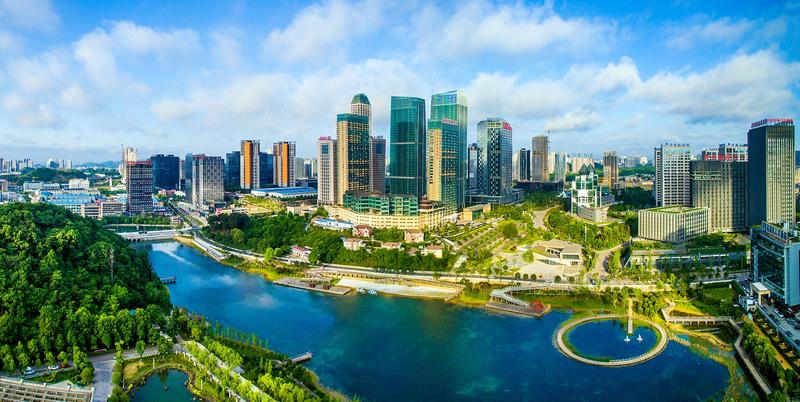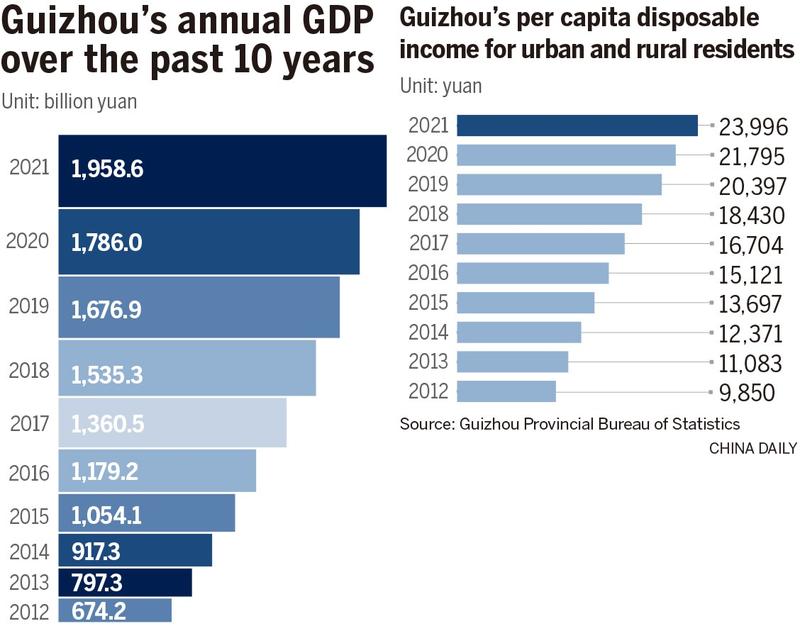Province sees progress as it strives for high-quality development while improving its environment
 The Beipanjiang Bridge of the Hangzhou-Ruili Expressway is one of the world's highest bridges at a height of 565.4 meters above the Beipanjiang Grand Valley in Guizhou province. (PHOTO PROVIDED TO CHINA DAILY)
The Beipanjiang Bridge of the Hangzhou-Ruili Expressway is one of the world's highest bridges at a height of 565.4 meters above the Beipanjiang Grand Valley in Guizhou province. (PHOTO PROVIDED TO CHINA DAILY)
Editor's note: China has seen tremendous changes nationwide, from economic growth to environmental protection, from social improvement to cultural progress. In this series, China Daily maps the changes and tells the stories of the people who lived through them.
From a small snack workshop to Guizhou's top healthy food manufacturer, Hot Chishui Group has seized every opportunity to grow amid the province's efforts to realize high-quality development and a greener economy.
In less than two decades, the company's sales revenue grew from less than 1 million yuan to 357 million yuan (52.83 million) last year and is expected to reach 400 million yuan by the end of the year. Despite the COVID-19 epidemic, it still saw an over 20 percent growth in sales revenue last year, with products sold across the country through more than 600 distributors and exported to nations including the United States, Singapore and Malaysia.
Located in Chishui city, the company is among many that have benefited from the province's measures to boost economic growth while protecting its environment and ecology.
 Students enjoy their free lunches at a rural primary school in Huishui county, Guizhou. (PHOTO PROVIDED TO CHINA DAILY)
Students enjoy their free lunches at a rural primary school in Huishui county, Guizhou. (PHOTO PROVIDED TO CHINA DAILY)
In the past decade, the province has ramped up efforts to push the low-carbon transformation of traditional industries; to promote the development of businesses in the tertiary sector, such as tourism; to improve air and water quality; and to encourage the preservation of trees and active planting.
"Since the company's founding in 2005, we have been actively seeking cooperation with universities and institutes to fully leverage technology for product innovation and update the manufacturing process while taking advantage of the government's supportive policies to encourage high-quality development. We have also ramped up efforts to explore raw materials in forests and develop healthy foods such as bamboo shoots, as the improving ecology and environment in Guizhou provide an abundance of natural resources," said Deng Qibin, general manager of Hot Chishui.
The company now covers an area of 14 hectares and has a factory occupying 100,000 square meters. It develops snacks whose raw materials are found in forests, such as bamboo shoots and mushrooms, and has built production lines with modern food processing technologies. By growing bamboo shoots in local villages and counties, the company offers jobs to over 400 villagers whose annual incomes now surpass 55,000 yuan per person.
 Black-necked cranes roost at the Caohai Wetland in Guizhou. (PHOTO PROVIDED TO CHINA DAILY)
Black-necked cranes roost at the Caohai Wetland in Guizhou. (PHOTO PROVIDED TO CHINA DAILY)
Since 2016, Chishui has lessened its focus on raising the GDP of its counties and villages and their ability to attract investment. Instead, the city stressed the development of the green economy, such as producing paper made of bamboo pulp, bamboo furniture, organic food and tourism in answering the provincial government's call for high-quality and greener economic development.
Switching focus from economic growth to green development didn't drag down the local economy in Chishui, but instead pushed the city to explore a path of high-quality development. Last year, the city's GDP was 1.8 times that of 2016, while its forest coverage rate reached 82.51 percent.
Local residents have also benefited from Chishui's transitioning to a greener economy. Yin Tianfu, a villager who lives at the foot of Tiantai Mountain in Chishui, has seen his annual income continue to grow and exceed 100,000 yuan last year.
Chishui is among five pilot areas where the Guizhou provincial government is promoting a transition to low-carbon development through efforts such as halting polluting projects, supporting the transformation of energy-intensive industries, encouraging the development of the digital economy and urging improvements in the environment and ecology.
 A panoramic view of the Guiyang Big Data Maker Park in the capital of Guizhou. (PHOTO PROVIDED TO CHINA DAILY)
A panoramic view of the Guiyang Big Data Maker Park in the capital of Guizhou. (PHOTO PROVIDED TO CHINA DAILY)
Last year, the province rejected 171 projects, whose investment totaled 22.9 billion yuan, mainly because they didn't meet environmental standards set by the government.
Guizhou's curbing of pollution-emitting projects didn't affect its economic development. Last year, the province saw the industrial added value of companies whose revenue from main businesses exceeds 20 million yuan grow 12.9 percent year-on-year.
In April, five departments in Guizhou jointly released a document that specified measures to promote the digitalization of industries, including offering up to 10 million yuan in subsidies and financial awards for major companies that build digitalized production lines, workshops equipped with unmanned technologies and smart factories. Financial support is also given to small and medium-sized companies that adopt digital transformation.
For energy-intensive industries like coal mining, the provincial government has launched supportive policies, such as awarding up to 6 million yuan to designated mines that have made progress in the research and development of artificial intelligence used in mining.
Guizhou has also rolled out measures to support 5G infrastructure construction, new energy vehicles, new materials and industries in the aerospace sector. In addition to encouraging low-carbon development, the province is also responding to a national campaign to improve the environment and ecology.

At the Shunhai State-owned Forest Farm in Guiyang, capital of Guizhou, generations of efforts have turned it from an arid area totaling 2,000 hectares to green land. Founded in 1958, the farm stretches across three districts-Nanming, Yunyan, and Wudang. It is 23 kilometers long and 15 km wide. Its forest area is 1,944 hectares, with a forest coverage rate as high as 90 percent.
"Guizhou will continue to promote green and low-carbon high-quality development, encourage companies to accelerate their green and low-carbon transition, put stricter limits on approvals of energy-intensive and high-emission projects, and improve services for major project constructions," said Yang Tongguang, head of Guizhou's Bureau of Ecology and Environment.
In addition to promoting a green economy, Guizhou has also stepped up efforts in infrastructure construction, poverty alleviation, education, healthcare and housing in its pursuit of high-quality development.
Through such efforts, Guizhou's GDP grew from more than 674.2 billion yuan in 2012 to nearly 1.96 trillion yuan last year, and the province is now home to nearly 3.89 million businesses.
Wang Jin contributed to this story.
Contact the writers at liuyukun@chinadaily.com.cn


